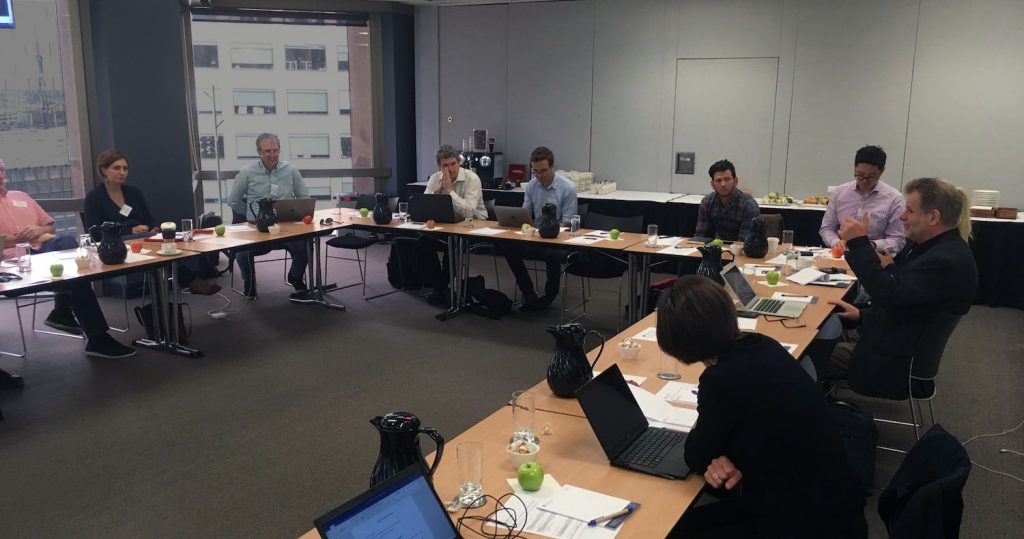by Ian Macadam
“So what is a knowledge broker anyway?” It’s a question as the leader of the CLEX Knowledge Brokerage Team I get asked a lot (no doubt to the relief of some of you who have been doing the asking). The Knowledge Brokerage Team is now six months old and it’s high time an answer was forthcoming.
Unfortunately, Wikipedia is pretty vague on the subject and explains this vagueness by basically saying “It depends on the context”. The short answer in the CLEX context is that a knowledge broker helps our academic researchers communicate with the oft-referred-to “real world”. The long (and hopefully more satisfactory) answer is the subject of a discussion session that Ian has been leading at each of the CLEX nodes. Watch this space if you have yet be involved in one of these.
As well as communicating within CLEX, the CLEX Knowledge Brokerage Team has been growing and ramping up its efforts to build relationships with Australian governments, businesses and schools.
In March, the team recruited James Goldie. James is no stranger to CLEX, having recently completed his PhD on “Drivers of human heat stress across Australian climates” at the UNSW node. His communication and technical skills will be a great addition to the team. James’ work for CLEX will focus on further development of the CLIMDEX website on extreme indices.
A particularly exciting aspect of James’ position is that it is a joint position with the Monash Climate Change Communication Research Hub. He sits at the Hub’s offices at Monash University’s Caulfield campus in Melbourne. The Hub conducts social research and leads projects to help the Australian media adequately address climate change. James’ position there will facilitate collaborative work with CLEX researchers.
The Knowledge Brokerage Team has recently coordinated a series of events aimed at better understanding the interests of our non-academic stakeholders and giving them a taste of what we do. These have included a joint seminar event with the NSW Office of Environment Heritage, where we heard all about the office’s exciting climate science programs and provided short 10-minute snapshot talks on a variety of CLEX research projects. Conversations with other stakeholders, including the Victorian Government Department of Environment, Land, Water and Planning and private companies Risk Frontiers and IAG continue apace.
A particular highlight of the year so far has been a workshop on the future development of the WeatheX citizen science mobile phone app. Working with developers at We Make Apps, CLEX researcher Joshua Soderholm has developed the WeatheX app (available at the Apple App Store and Google Play now) to allow the public to report and photograph observations of hail, strong winds, tornadoes and flooding. The unique dataset generated will be valuable for determining the footprint and severity of severe weather events in real-time. Once collected across many years, the data will also provide a powerful ground truth for understanding how large-scale weather and climate systems drive these finer-scale weather extremes.

The workshop brought together representatives of the climate research, weather forecasting, emergency, insurance, media and government sectors to brainstorm how the app could be further developed to tap this potential goldmine of information.
CLEX now has a series of briefing notes designed to inform governments and business about relevant developments in the science of climate extremes. Subjects covered so far include uncertainties in extreme rainfall projections and the Ozflux observing network. These short notes are produced by the Knowledge Brokerage Team in close cooperation with subject matter experts within CLEX and are a way to reach stakeholders that don’t avidly consume the latest scientific papers.
The Knowledge Brokerage Team relies on working closely with CLEX researchers to be successful. Please contact Ian Macadam (i.macadam@unsw.edu.au) if you are keen to communicate your work to government, businesses or schools, have an idea for a briefing note or are simply curious about what the team does.
Thanks to all the CLEXers who have already been active in the knowledge brokerage space through participating in workshops and meetings, contributing to briefing notes or taking part in discussions about our outreach to schools.
